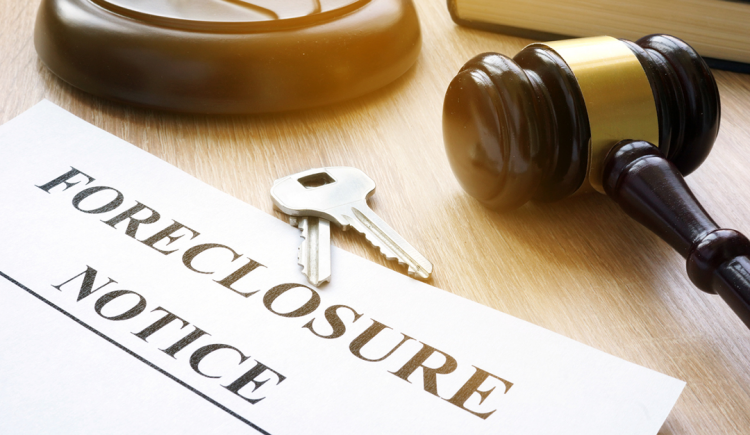Almost 2 million homeowners are still in mortgage forbearance as the national foreclosure moratorium nears its end on July 31. While that may be cause for alarm to borrowers still behind on payments, industry experts say they are optimistic that a wave of foreclosure is unlikely to come.
“Our economy is picking up,” says Marina Walsh, VP of Industry Analysis for the Mortgage Bankers Association’s (MBA) Research and Economics Department. “There is an improving job market right now and a robust housing market. We’re not in a situation we were in ten years ago with the Great Recession where homes were substantially underwater nationwide.”
While there are still homeowners that are financially distressed from the pandemic, Walsh says the MBA has seen signs of a rebound, particularly in loans in forbearance. According to the MBA’s latest survey on July 12, the total number of loans in forbearance dropped by two basis points, continuing a 19-week decline.
The delinquency rate for mortgage loans on one-to-four-unit residential properties has also shown some positive signs, according to the MBA’s latest National Delinquency Survey.
The delinquency rate of the first quarter of 2020 declined 35 basis points from the fourth quarter of 2020. However, the rate is up 202 basis points from the same period the year before.
“I would say that we are cautiously optimistic,” Walsh says.
Risk of increased Foreclosures
Despite improvements among borrowers and an additional 31 days tacked on to the moratorium deadlines, concerns over homeowners losing their homes haven’t completely dissipated.
“As the nation shifts from the COVID-19 emergency to the economic recovery, we cannot be complacent about the dangers we still face,” said Dave Uejio, acting director of the Consumer Financial Protection Bureau (CFPB), in a June press release.
The agency has tried to beef up protections for borrowers ahead of the moratorium deadline to allow homeowners to explore their options to avoid foreclosure.
According to the CFPB, more than 3% of all borrowers are four months or more behind on their mortgages, which is the point when a foreclosure may be initiated.
That equates to about 1.8 million, according to recent research from the National Association of REALTORS®.
When the moratorium ends, the agency indicated that homeowners could be at risk of having foreclosure started as soon as they exit forbearance, with at least 900,000 homeowners projected to leave forbearance between now and the end of the year.
“An unchecked wave of foreclosures would also risk destabilizing the housing market for all consumers,” Uejio said. “We are giving homeowners the time and opportunity to make informed decisions about the best course of action for them and their families, whether that is seeking a loan modification or selling their home.”
Mortgage banks and lenders claim they are prepared for the moratorium to end as they look to work with borrowers and follow investor guidelines provided by CFPB.
A written statement from Bank of America said it is “committed to helping our clients, we are currently revising our processes to incorporate these additional opportunities and requirements.”
“While the moratoriums are now currently set to expire July 31, 2021, pursuant to the recently published CFPB Final Rules regarding mortgage servicing, many borrowers will be provided with additional opportunities to be considered for post forbearance assistance,” Bank of America said.
A Wells Fargo spokesperson shared a similar sentiment, adding that the bank/lender supports the CFPB efforts to help successfully transition from a payment suspension to resuming monthly mortgage payments.
“The new guidelines for agency loans do not impact our previous decision for portfolio loans, for which we have stopped all foreclosure-related activity on occupied properties through the end of 2021, except in very specific cases, and have halted all evictions through the end of the year as well,” the statement read.
Positive Outlook
Contrary to previous predictions, real estate brokers express optimism that the market won’t experience a flood of new foreclosures.
That’s primarily due to the lagging inventory coupled with strong demand and low interest rates, according to Rei Mesa, president and CEO of Berkshire Hathaway HomeServices Florida Realty.
“I believe that anyone who’s fallen behind on their payments and wants to sell their home will have a buyer willing and able to purchase for potentially more than what they think their home is worth right now and enough to cover the mortgage and late payments,” Mesa says.
While the market will likely see spikes in late payments, Mesa says today’s market is a far cry better than during the last crash.
According to Anthony Lamacchia, CEO of Lamacchia Realty, positive equity is a primary difference from a decade ago.
“Last time when the market crashed, a lot of people got behind and couldn’t sell,” Lamacchia says. “There were a lot of good honest people who tried to sell and get out from under, but they couldn’t because they were upside down. This time, the people that need to sell are going to be able to sell because they are not upside down.”
Recent data from CoreLogic found that U.S. homeowners with mortgages saw an almost 20% year-over-year increase in their home equity since the first quarter of 2020. Their equity has increased by a total of nearly $1.9 trillion.
A tighter lending market following the last recession is another positive indicator inr today’s market, according to Eric Spotswood, regional mortgage manager at Prosperity Home Mortgage.
“I think part of the major issue with the last crisis was there were a lot of unqualified buyers,” Spotswood says, indicating that the past deluge in foreclosures was due to over-lending with lower qualification requirements.
“There were a lot of adjustable-rate mortgages where borrowers only had to qualify themselves for the principal payment,” Spotswoods continues. “But, the reality is they were going to become principal in interest, and all of a sudden, that became an issue because they couldn’t afford it.”
Spotswood suggested that isn’t the case in today’s market, adding that getting approved for a mortgage is more challenging than it has been in recent years.
Though large-scale foreclosures seem unlikely, Lamacchia indicated there still may be an uptick in foreclosures.
“The biggest area you’ll see an uptick in the multifamily space because a lot of these landlords are getting killed with the eviction moratoriums, and they can’t evict anyone if they aren’t paying their rent,” he says.
Jordan Grice is RISMedia’s associate content editor. Email him your real estate news to jgrice@rismedia.com.













Surely, wait until all the stimulus package gone and reality will come!
Please stop lying to us This economy is in deep trouble and is ruined
This is outrageous!!! People, families everywhere are in panic. Having no clue what they’re going to do when this moratorium lifts. Me as well. Landlords and banks are sitting waiting ready to jump. And its sickening. We did NOT ask to be in poverty. Where is Biden now? Not everyone has kids. What about us???
It’s going to be alot of homeless people and I will be one of them ! Ehats people supose to do!!!
Note holders are going to exploit the red hot real estate market. Of course there’s a wave of foreclosures coming there’s no incentive to work with a borrower who’s behind when they can take a profit now. Aside from that the economy is NOT in good shape at all. It’s on life support due to stimulus.
I agree that the economy is not what it was in 2007 and the lending environment has changed. What we need to remind ourselves is that many small landlords that have not had access to funding and are underwater and will have to let go of some of their portfolio bringing in some inventory with non paying tenants that will cause Banks to have to manage these assets and turn them over to investors to recoup their losses. We need more inventory for working families and if this is the inventory that will be available then what will the rental environment be like for the existing owners? Some may opt to go for foreclosure because even if they sell they cannot relocate due to credit and potentially not wanting to occupy inferior housing. I believe we have an opportunity here to collaborate. The real estate community should work hand in hand with the banks to help efficiently transition all parties. Happy Sharing Great Article Jordan Grice